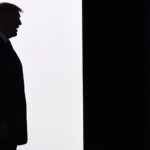
The darkest part of Donald Trump’s presidential campaign is its white nationalist element with some white male supremacists seeing Trump as the way to protect their historical dominance of America, says Nicholas C. Arguimbau.
The movie “Lincoln” was a dramatic depiction of the political fight to end American slavery with the 13th Amendment and presented a rare sympathetic portrayal of anti-slavery Congressman Thaddeus Stevens, played by Tommy Lee Jones. This offered a belated chance to…